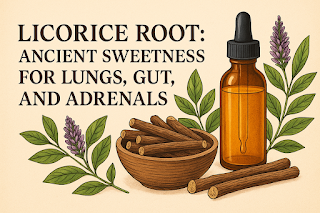Licorice Root: Ancient Sweetness for Lungs, Gut, and Adrenals
Licorice root is a powerful herbal remedy for lungs, gut, and adrenal fatigue. Learn how this ancient adaptogen supports respiratory health, digestion, hormone balance, and deep restoration.
It doesn’t just taste sweet — it reminds the body how to rest, repair, and trust again.
🌿 Licorice root (Glycyrrhiza glabra) is one of the most beloved herbs in traditional medicine, from Ayurveda to Chinese medicine to ancient Middle Eastern healing.
But this is no candy. True licorice is a powerful tonic for:
- inflamed lungs
- weakened digestion
- depleted adrenals
- hormonal imbalance
- emotional burnout
Its taste is unmistakable — rich, earthy, lingering. It speaks of deep reserves, stored sweetness, and slow healing.
🫁 1. Soothing the Lungs and Throat
Licorice is a classic respiratory herb, used for:
- Dry, irritated coughs
- Bronchitis or asthma
- Sore throat
- Voice strain or hoarseness
- Smoke or pollution exposure
It:
- Moistens dryness
- Soothes inflamed mucous membranes
- Helps the body expectorate gently
- Pairs beautifully with thyme, marshmallow, or slippery elm
🌬️ It’s especially helpful for people who feel dry, weak, and tight in the chest.
🍵 2. Gut Healing and Anti-Inflammatory Support
Licorice calms the stomach lining and intestines, and is used for:
- Acid reflux and heartburn
- Ulcers or gastritis
- Leaky gut or IBS
- Post-antibiotic gut recovery
It coats the gut like a balm, while also balancing the gut flora and reducing inflammation.
✨ Especially effective in DGL (deglycyrrhizinated) form for ulcer support.
💛 3. Support for the Adrenal Glands and Stress
Licorice is a powerful adaptogen, meaning it helps the body regulate stress hormones — particularly cortisol.
It’s used to:
- Support people in adrenal fatigue or burnout
- Extend the action of natural cortisol when it's too low
- Reduce fatigue and “crash” after stress
- Stabilize blood sugar during exhaustion cycles
🌿 Especially useful for perimenopause, postpartum recovery, or after long illness.
🌺 4. Hormonal and Reproductive Ally
Licorice gently influences estrogen and androgen balance, making it helpful for:
- PCOS
- Menstrual irregularity
- Female hormonal acne
- Menopause transition support
It is one of the few herbs that is both cooling and tonifying, sweet and regulating.
💡 Use with care — strong hormonal actions mean it’s not for every person.
✨ 5. Energetic and Symbolic Role
Licorice teaches the value of stored sweetness — of not rushing healing.
It brings:
- Moisture where there’s dryness
- Trust where there’s fear
- Deep nourishment where there’s depletion
In ancient texts, it was called “the harmonizer” — softening strong formulas, binding other herbs together.
🌿 It is a herb of integration, depth, and returning to the root.
🍯 6. How to Use Licorice Root
Tea:
- 1–2 tsp dried root per cup
- Simmer 10–15 minutes
- Sweet on its own — no honey needed
Tincture:
- 5–20 drops in water for adrenal or gut support
Powdered root:
- Can be blended into warming adaptogen blends
DGL tablets (deglycyrrhizinated licorice):
- Safer for long-term gut healing in those with high blood pressure
⚠️ Cautions
- Raises blood pressure in high doses or sensitive individuals
- Avoid in pregnancy unless under guidance
- Not for long-term use without breaks
- Monitor in people with kidney issues or heart conditions
Use with respect and attention — this is strong medicine.
✨ Conclusion: Deep Sweetness for a Depleted System
Licorice is not a quick fix. It’s a reminder to rebuild.
To let sweetness into the organs that forgot how to trust.
To moisten what’s gone dry from too much fire.
Use it when you’ve given too much.
When your throat is raw from holding back.
When your body needs a soft, ancient yes.
Let licorice say: “You are held. You are safe. You don’t have to push.”



Comments
Post a Comment